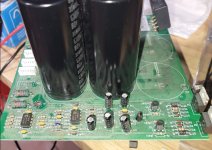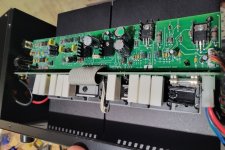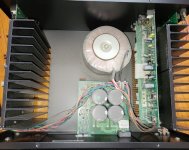So I picked this and a preamp up for a pretty good deal. When I play the amp it sounds great - crystal clear, but it doesn't pull that really low bass. I ran an A to B with my McIntosh MAC6700 and there was on audible difference in the amount of low bass produced. I used the preamp section of the MAC6700 for the Anthem too. Is there something I could replace in the amp to remedy this? It is probably nearing 20 years old. Would replacing the bypass caps or the power supply caps improve the bass output? I hate to tear it open, but I am a little bummed out. I am not even sure where to start, or just ignore it and pair it with some bookshelf speakers that don't hit the low bass anyway.
Thank you.
-Geoff
Thank you.
-Geoff
I'll try that too. Might have to get those ordered though.Perhaps a coupling cap has dried up, if there is an electrolytic cap on the input, try there?
-Geoff
Give me a couple days and I will unsolder them and check. I wish I had a service manual.
I appreciate the info. I didn't want to recap this amp unless there was a reason. I didn't think it would still sound so good but still need a recap.
Thank you.
-Geoff
I appreciate the info. I didn't want to recap this amp unless there was a reason. I didn't think it would still sound so good but still need a recap.
Thank you.
-Geoff
Try measuring them in circuit, with cord unplugged and caps discharged.
At worst, you'd just need to disconnect the wires to the audio board.
I wouldn't unsolder any capacitors, because the board might be damaged.
Might as well try the input blocking cap first, since it's easy to do.
At worst, you'd just need to disconnect the wires to the audio board.
I wouldn't unsolder any capacitors, because the board might be damaged.
Might as well try the input blocking cap first, since it's easy to do.
The input board is going to take more time. I need to get the right tools - I only have metric and I think they are SAE or a size I don't have. There is no way to measure any caps on them without popping the board out because it backs up to a heat synch.
I did get the power board out. It looks like two pairs of 15,000 uF caps, in parallel pairs. They measured 27,100 and 26,780. So they are both down. I also noticed that the board can take three in parallel where there is only two now - should I replace the four with six new ones? Is that overkill?
Thank you.
-Geoff

I did get the power board out. It looks like two pairs of 15,000 uF caps, in parallel pairs. They measured 27,100 and 26,780. So they are both down. I also noticed that the board can take three in parallel where there is only two now - should I replace the four with six new ones? Is that overkill?
Thank you.
-Geoff
Looking on Digikey and it looks like I can't get a 15,000 anyways. Either have to go with 6 x12k or 6 x 10k. Still Chemi-Con and still the same SMH series. Should I just get the 12k? Seems like it wouldn't hurt.
-Geoff
-Geoff
Yes, overkill in a good way!I also noticed that the board can take three in parallel where there is only two now - should I replace the four with six new ones? Is that overkill?
Check Mouser as well?
Yea, I looked everywhere and the best I could find in stock was 12k uF. Mouser had even less in stock. Just going to put six in and call it a day. it will give me a nice bump in capacitance, and getting the same brand and product line is a bonus.Yes, overkill in a good way!
Check Mouser as well?
I tried Anthem for a schematic for the amp and they gave me a bunch of excuses. They wanted me to give them $160 up front, international shipping both ways, plus undetermined parts pricing. I don't think that amp is even worth that much? Crazy. Why a stereo company is holding 20 year old schematics so tight is beyond me. I pointed out to them that some very high end brands release that info when something goes into the past model status.
-Geoff
What else is on the PS board? Looks like a couple of V regs and some op amps? Take some pics?I did get the power board out.
Here is the PS. Behind the caps is just plugs the input from the transformer and the power outputs to the input and outboard boards on each side. I wish I had a schematic! I emailed their service department and they refused to release one. I even asked for a local screenshot of the schematic with the coupling caps and their values. No reply on that request.
But for $160 up front, unspecified parts charges, and international two way shipping, they will fix whatever they think is wrong. What a load of crap. McIntosh releases schematics, but Anthem won't? Give me a break.
-Geoff

But for $160 up front, unspecified parts charges, and international two way shipping, they will fix whatever they think is wrong. What a load of crap. McIntosh releases schematics, but Anthem won't? Give me a break.
-Geoff

Can you trace the tracks and clip test leads to nearest component?The input board is going to take more time..... There is no way to measure any caps on them without popping the board out because it backs up to a heat sink.
I don't know! I am pretty sure that it is a Fairchild logo. But when I google the numbers I don't get anything. My guess is that it is the bias current power supplies for the input stages (there is one plug to each input board). So maybe they are Mosfet or Fet regulated? It is just a shot in the dark without a schematic unfortunately.What are Q3 and Q4?
-Geoff
I finally got one of the input boards loose enough to read the back side. There are three big 100 uF caps right near the ribbon that connects to the output stage, so I am guessing the are coupling caps, but they seem awfully big for that! They all read 200-300 uF. The problem is that I can't tell if they are high because I am reading them in circuit or because they are just bad. And without a schematic I can't do the math and calculate what it should be.Can you trace the tracks and clip test leads to nearest component?
Tomorrow the main PS caps will be in and I am going to recap the PS plus the five 22 uF caps on the board. Putting the power supply back in doesn't block the input boards, so it isn't going to save me any time doing it all at once. I feel like doing the power supply was the right thing since I am going to add 30% more capacitance. I will wait to do the input boards. Mostly because I would need to order a bunch more caps and I want to listen to it for a while!
-Geoff

Show us some clear pics!It is just a shot in the dark without a schematic unfortunately.
- Home
- Amplifiers
- Solid State
- Anthem MCA20 - Reduced Dynamic Range
